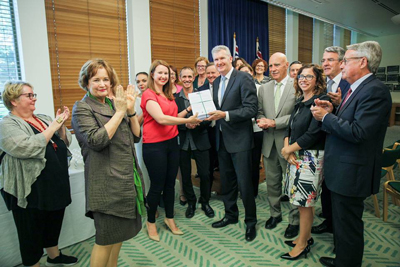The Australian book industry publishes more than 20,000 titles every year, generating over $2 billion in revenue, investing $120 million in Australian books and their promotion, employing up to 40,000 Australians across the supply chain. The Australian book industry does not depend on tariffs or subsidies. It is one of our largest cultural success stories, of which we can be rightly proud.
However, the Productivity Commission made a recommendation to the Australian government in a report made public in December 2016 that could put all this at risk. The Productivity Commission recommended that Australia lift parallel importation rules (PIRs) on books.
Currently the parallel importation of books into Australia is regulated, which means that retailers can only buy bulk copies of a book from the publisher who holds Australian rights. That publisher has to make that book available in Australia very quickly in order to retain their exclusivity, however, and both booksellers and consumers are free to purchase single copies of any book direct from overseas suppliers at any time.
Opponents of PIRs hope that if the rules changed, local booksellers will become more competitive with lower retail prices and more timely availability of titles. However, the reality is that Australia is a highly competitive book market with bookshops, book chains, discounters, department stores and local and international internet retailers all slugging it out with the result that book prices have dropped in real terms by 30% in the last 10 years. In addition, many popular titles are routinely sold at 35% discount in major retail chains.
The removal of PIRs would essentially dismantle the concept of territorial copyright for Australian authors and their publishers, a benefit that would still be enjoyed by their colleagues in the UK and USA. This would have the effect of:
In December 2015 the Federal government announced plans to proceed with the removal of PIRs on books once the Productivity Commission had completed its review into Intellectual Property. The ASA called upon the government to reverse this decision and retain PIRs.
In December 2015, the ASA authored a petition against the parallel importation of books. The ASA petition became the focus of an industry-wide campaign bringing together the ASA, the Australian Publishers Association (APA), the Australian Booksellers Association (ABA) and others as Books Create Australia, and over 12 months gained nearly 20,000 signatures from authors, illustrators, publishers, editors, literary agents, printers and book-lovers.
With the help of the ASA, members made passionate submissions to the Productivity Commission in defence of the local industry that supports them, wrote to Federal MPs and Senators and campaigned with messages to readers on social media and at festivals and events.
In addition, the ASA made its own submission to the Productivity Commission in May 2016, accompanied by a letter of support from the International Authors Forum. The Books Create Australia alliance organised press and events to raise public awareness and put 20,000 bookmarks directing readers towards the ASA petition in independent Australian bookshops.
Finally, in November 2016 Books Create delegates accommpanied authors Hannah Kent, Andy Griffiths, Magda Szubanski and Jackie French to Parliament House for a formal presentation of the ASA petition to Labor MP Tony Burke.

Hannah Kent presents ASA petition against parallel importation to Tony Burke MP
The Books Create delegation then spent three days traversing Parliament House, meeting with more than 20 MPs and Senators from all parties to speak against the Productivity Commission's mission to make sweeping changes to the Copyright Act, based on out-of-date information and a very close-minded approach. The culmination of the 2016 Books Create campaign, this was the first time the book industry has spoken with one voice on the issue of territorial copyright.
The delegates met with politicians from all sides of government with the result that the Nick Xenophon Team, Jacqui Lambie and the Australian Labor Party all publicly declared their support for Australian books and opposition to parallel importation.
In August 2017, in its response to the Productivity Commission's recommendation to repeal PIRs, the Government said it would consult with the book industry to develop a reform pathway that is in the public interest. In its subsequent 2018 Copyright Modernisation Consultation Paper, the repeal of PIRs had been put on hold.
For now, yes. The result of the Books Create campaign was that the Government stepped back from plans to remove parallel importation restrictions.
The ASA's view remains that parallel importation restrictions are appropriate and necessary for a thriving local industry. We mustn't forget that copyright is the legal framework by which all authors and illustrators earn a living. Territorial copyright protections have supported creative and innovative careers.
The campaign to retain parallel importation restrictions is a good example of the ASA working in collaboration with other industry bodies for the benefit of all Australian authors and illustrators.
If you haven't already, consider joining the ASA. The ASA's lobbying efforts in Canberra would not be possible without our members' support. The more voters we can show we represent, the clearer our voice will be heard by the politicians with the power to make change.
Alternatively, if you're already a member or prefer to contribute without joining the ASA, you can donate to our Endowment Fund. Donations to the Endowment Fund go directly towards supporting the ASA to lobby and campaign for the rights and professional interests of authors and illustrators.
Keep up-to-date with ASA advocacy, support and advice
with our fortnightly newsletter.